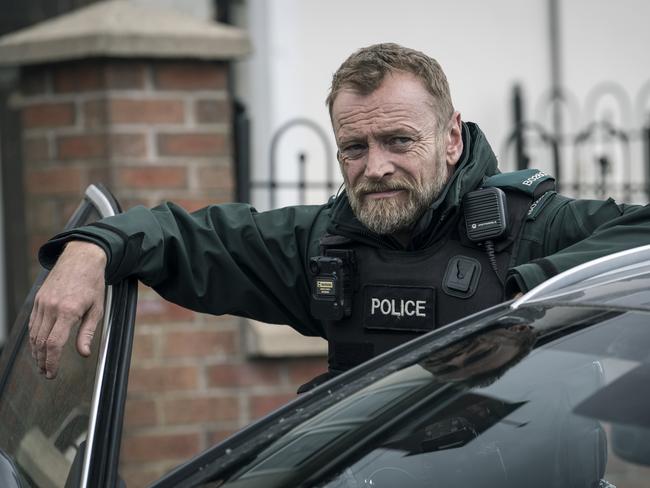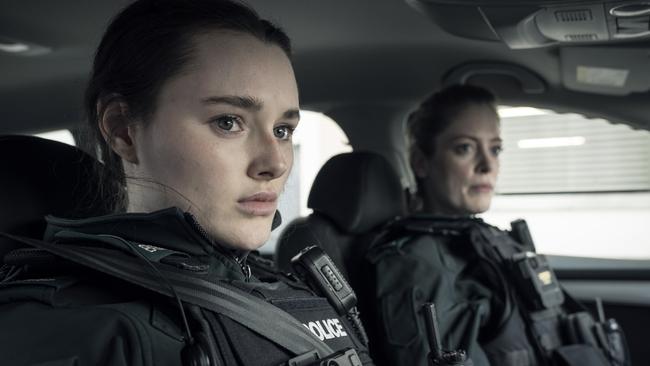BBC’s Blue Lights reveals the realities of policing in Belfast
The writers of BBC’s Blue Lights researched the series riding along in the back of police squad cars for months and spending time with retired and serving officers in Northern Ireland.

Mystery TV shows, like the novels from which many emanate, remain compelling, even after every idea and aesthetic convention seems to have been employed, altered, updated, satirised, ravaged and originalised.
No matter how obtuse, noirishly violent or charmingly cozy, they provide us with a glimpse of a world as it ideally might be, where men and women investigators, some legal, some unlicensed, are obsessed with that disparity between law and justice. They are simply determined not to stand around and allow the worst aspects of human nature to triumph while they do nothing about it.
As the British crime writer John Harvey – author of the award-winning Nottingham-based Charlie Resnick novels – says, those who create crime mysteries tell stories about people we care about, but more importantly use them “as a tool with which to open up and expose a small area of society to examine and understand”.
In the BBC’s Blue Lights, it’s the policing of Belfast in Northern Ireland that is the subject for examination in this bracing, occasionally darkly humorous, and ultimately empathetic new series.
It follows the story of several probationary police officers in the PSNI or the Police Service of Northern Ireland, successor to the Royal Ulster Constabulary (RUC) after it was reformed and renamed in 2001 on the recommendation of the Patten Report.
The idea was to transform the largely Protestant force in response to the legacy of the so-called “Troubles”, that terrible 30-year sectarian conflict, and the deaths of more than 3500 people. Patten looked at the policing of divided communities, urging the demilitarisation of the police and the shedding of its machine guns, military-style Land Rovers, and interrogation centres; the Union flag would no longer flap defiantly above the heavily guarded police stations.

The six-part series follows the trials and tribulations of three probationary police officers working in a city where being a first responder means coping with unique pressures and a constant threat as they work the crime beat. The show focuses on Grace (Sian Brooke), Tommy (Nathan Braniff) and Annie (Katherine Devlin), Grace, a former social worker, the oldest at 41. They are supervised to a large extent by Sergeant Annie Conlon, superbly played by Katherine Devlin, an experienced officer with steely resolve.
They have only a few crucial months to prove themselves as Belfast peelers as they daily encounter stories of calamity and tragedy in a city where the past is always just around the corner waiting in ambush. And during that time, they must find a way to cope with the realisation that cops are a small part of a fiercely self-devouring bureaucracy.
The series is also a story about the ambiguities of policing, the pressure under which these young police learn to operate, and the frustration endemic in the job. As probationers, the new recruits must learn quickly how to survive in the still reforming force supposedly built around community relations and human rights, rather than the protection of the state.
This is in a politically marginalised city still reeling from the toxic effects of Brexit, and the possibility of the fracturing of the hard-won peace, and a police force still attempting its reunification with the local society it serves.
The show is created by Northern Ireland writer-directors Adam Patterson and Declan Lawn (The Salisbury Poisonings), the latest commission from the partnership between the BBC and Northern Ireland Screen partnership agreement.
The idea behind it: to ensure that content filmed and set in Northern Ireland is brought to audiences across the UK and internationally. Lawn and Patterson also wrote the series, which is directed, and executive produced by Gilles Bannier. He most recently directed Trigger Point for ITV, starring Vicky McClure, the channel’s highest rated drama of past the year with 10.9 million watching it launch.
“As with any other profession where you are a trainee you might be in a college environment or a learning institution but with the police force after an initial training period you suddenly find yourself on the street, with a gun, and it begs the question: how do normal people deal with that? And that’s what interested us,” Patterson says.
The reality for these rookies is that their best day can quickly turn out to be their worst. All its leading characters are intimately aware of an accepted wisdom that cherishes sectarian assassinations, acetylene torches in garages, and photographs of entry and exit wounds.
In preparation the two writers, both experienced journalists, researched the series riding along in the back of police squad cars for months and spending time with retired and serving officers.
They also drew on Patterson’s personal experience of growing up during the Troubles with a family member in the prison service, a gun nearby with all the security measures that came with it.
“It was only when I was a bit older that I realised that wasn’t normal. It made Declan and I intrigued as to how the police deal with it in modern society,” he says. “That’s why Blue Lights is about character and how normal people separate the job and the duty from then going home afterwards and distilling the things they have seen.”
Lawn points out that police still check under their cars, and they still tell their children not to tell anyone that their mother or father is a police officer.
“That is what distinguishes being a cop in NI from being a cop elsewhere in the UK and how does that impact on a family dynamic when you are telling your child to lie about your job,” he says. “This is a job you take home with you and when you train for this job you are told that, but you don’t really understand it until you start working as a police officer.”
The first episode, “The Code”, focuses mainly on Grace, a single mother who lives with her 17-year-old A-level student son, Cal, (Mathew Carver), determined, after an unsatisfactory, frustrating career as a social worker, to do a job where she can really make a difference. She is partnered with the experienced officer Stevie (Martin McCann), something of a gourmand who prepares his lunches at home and is hooked on heavy metal.
He gives Grace the rundown on the realities of policing in Belfast: don’t wear a name badge in certain areas and don’t get involved in the problems encountered on the job. “We do what we can on the day; that’s what the job is,” he tells her. “If you try and do more than that, you won’t last a year.”
Tommy is gentle and somewhat ingenuous, hopeless at the mechanics of policing – he still hasn’t passed his weapons test. He is also paired with long-time officer Gerry (Richard Dormer), a bit of a joker, who calls Tommy “Columbo”.
Annie arrives at work horribly hungover, devours energy drinks and gets involved in an altercation with Mo McIntyre (Michael Shea), son of the infamous gang boss James McIntyre (John Lynch), whose family is of interest to terrorism and organised crime police. Their undercover agents are derisively known as the “sneaky beakies” and treated with contempt by the police.
They are all vulnerable with no idea how their new jobs will pan out, each involved with high stakes drama as the episode plays out, with Grace becoming a target for the sneaky beakies when she’s involved with suspects under surveillance in West Carrick, the area strictly “OOB”, out of bounds.
As an ensemble story it is beautifully acted, the characters all authentic and believable, and at times the Belfast accent gives the most banal pronouncement an almost Joycean profundity.
It’s lovely to listen to; the Northern Ireland voice puts more emphasis on vowels, which makes sentences longer and there is the lilting Scots residue dating back to the time called Plantation when the North was forcibly settled by them.
Bannier’s direction is assured. In the documentary fashion, much of the photography is handheld, giving the action scenes an immersive sense of propulsion almost as if we in the audience are dodging missiles or chasing gangsters. It’s relentless, unnerving, urgent storytelling and TV drama that matters. The action is propelled by an insistent pulsing soundtrack from Eoin O’Callaghan, making clever use of pop songs from Irish bands such as The Strypes and the garage punk blues of the Bonnevilles.
As Bannier says there is no “whodunit” or intricate plot so, “I soon realised I had to put my director’s ego to one side and learn to address what we needed to make the show work as a character-driven story.” And he does so with control, not only enhancing the naturalism of the acting in his blocking and framing but adding in a nice array of voyeuristic thrills.
Blue Lights streaming on SBS On Demand.


To join the conversation, please log in. Don't have an account? Register
Join the conversation, you are commenting as Logout